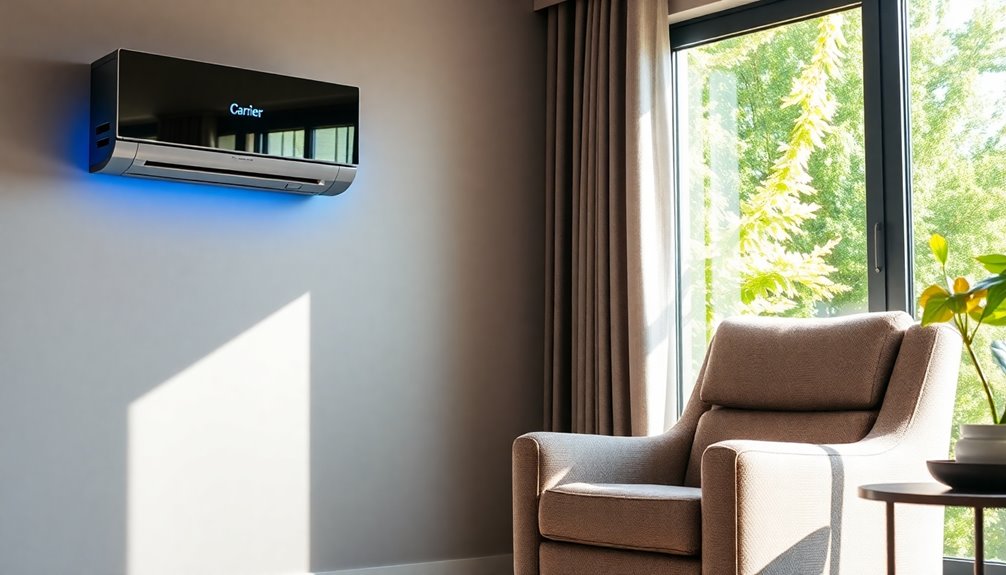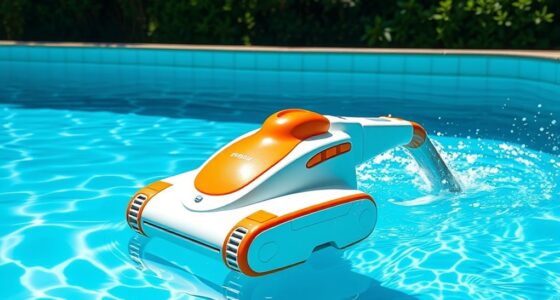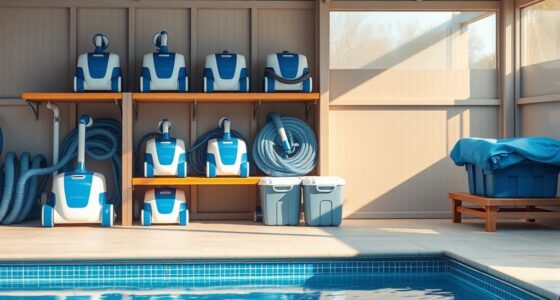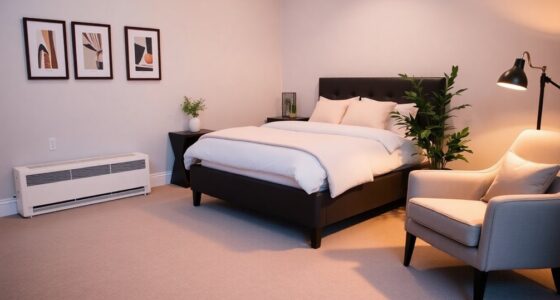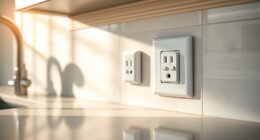When choosing between Carrier Performance and Comfort HVAC systems, consider your priorities. The Performance series offers improved energy efficiency with up to 16.5 SEER, making it great for saving on energy bills. It also features quieter operation and better airflow. On the other hand, the Comfort series is budget-friendly and provides reliable single-stage compressors. Think about your budget, noise sensitivity, and long-term savings. Understanding these key differences will help you find the right fit for your home. As you weigh your options, there's more to explore about how these systems can meet your specific needs.
Key Takeaways
- Efficiency Ratings: The Carrier Performance Series offers up to 16.5 SEER, providing better energy savings than the Comfort Series with a lower SEER rating.
- Compressor Types: Performance models feature variable-speed compressors for improved airflow, while Comfort models typically use reliable single-stage compressors.
- Noise Levels: Performance systems operate quieter than Comfort units, making them more suitable for noise-sensitive environments.
- Budget Considerations: Comfort Series units are generally more budget-friendly, while Performance Series models offer enhanced features for a higher upfront cost.
- Smart Features: Both series can incorporate zoning and smart thermostat capabilities, improving overall efficiency and control over your home's climate.
Efficiency Comparison
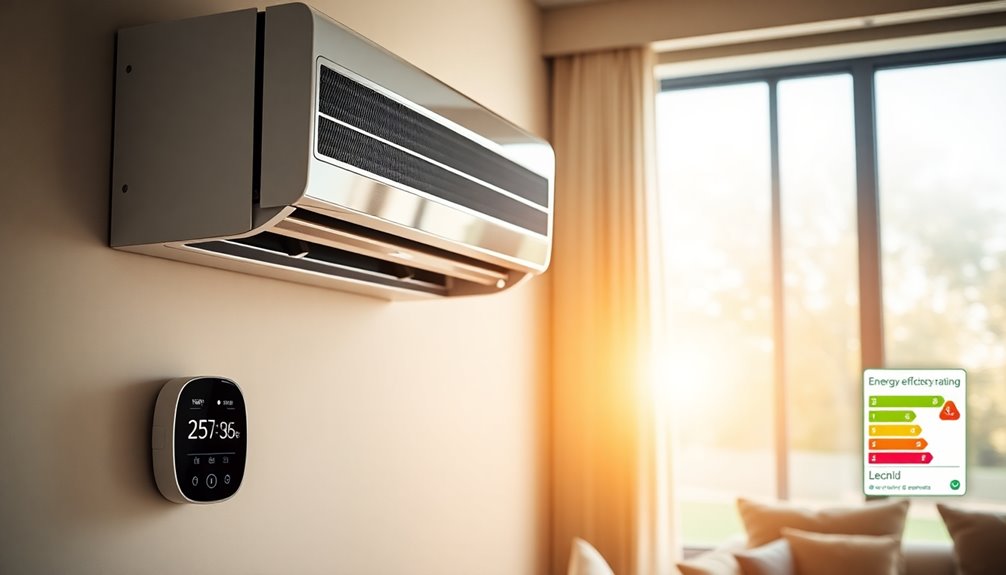
When considering HVAC systems, understanding efficiency comparisons is essential for making informed decisions.
You'll want to look at SEER ratings, which measure air conditioning efficiency over a typical cooling season. A higher SEER rating means better energy efficiency and lower utility costs. For instance, modern systems can reach SEER ratings up to 25, while older models might only rate around 6. Higher SEER ratings indicate better energy efficiency and can lead to significant savings over time.
Similarly, EER ratings gauge cooling efficiency at specific outdoor temperatures, particularly useful in consistently hot climates. Additionally, if you're considering heat pumps, look for HSPF ratings, which indicate heating efficiency.
Durability and Reliability
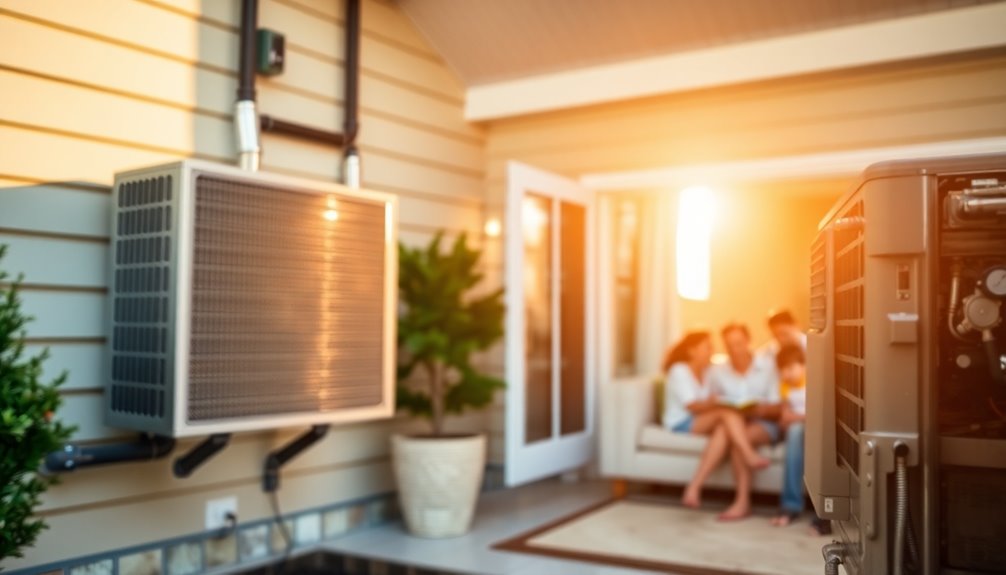
Durability and reliability are vital factors to take into account when selecting an HVAC system, as they directly impact your long-term comfort and maintenance costs.
Systems like the Trane XV20i can last 20 years or more, while heat pumps may reach up to 25 years if properly maintained. Brands like Carrier and York are known for their reliability, though Trane stands out for durability. Regular maintenance is essential; the mean time between failure (MTBF) indicates how often your system might need repairs. Additionally, durability features such as guardrails in York systems can enhance longevity.
Ultimately, choosing a reliable system guarantees fewer breakdowns and reduced repair expenses, keeping your home comfortable year-round.
Noise Levels
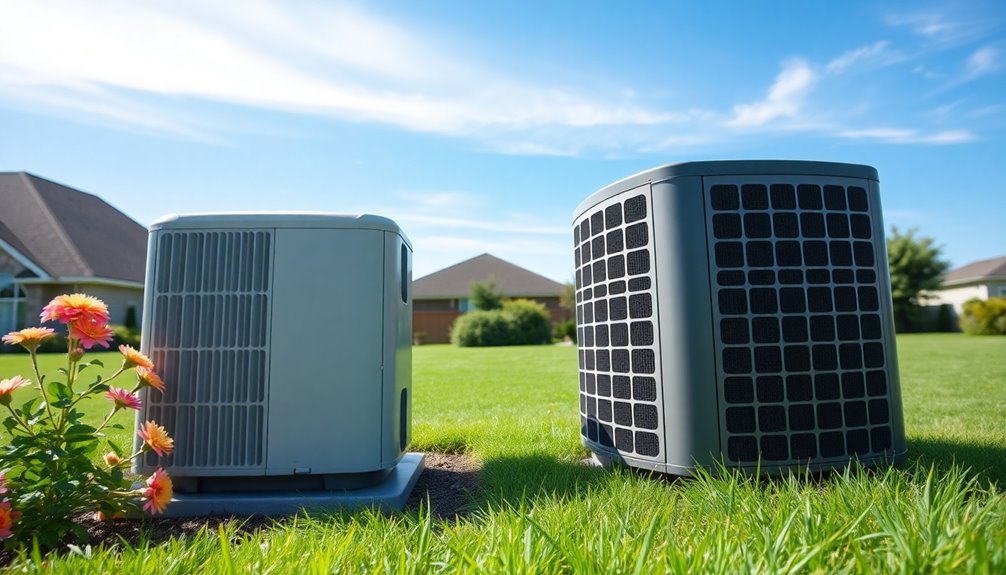
When choosing an HVAC system, noise levels can considerably affect your comfort.
You'll want to compare the quiet operation of mini splits with the louder central air conditioners to find what suits your home best. Understanding noise reduction features can enhance your overall user experience, ensuring you enjoy peace and tranquility indoors. Additionally, many modern units are designed for whisper quiet operation, achieving noise levels as low as 19 dBA.
Quiet Operation Comparison
While selecting an HVAC system, noise levels can greatly impact your comfort at home.
Here's a quick comparison of noise levels from different models:
- Carrier Comfort Models: The Comfort 15 Compact operates at a quiet 65 dB.
- American Standard Models: The AccuComfort Platinum 20 ranges from 55-75 dB, offering flexibility.
- Trane Models: Trane heat pumps can go as low as 43 dB, ideal for noise-sensitive areas.
- Carrier Performance Models: The Performance 17 2-Stage model ranges from 71-74 dB, which is relatively noticeable.
Both brands emphasize reliability and performance, making them strong contenders for your HVAC needs.
Choosing a quieter system can greatly enhance your home's tranquility.
Take these noise levels into account when deciding which HVAC system suits your comfort needs best.
Noise Reduction Features
Selecting an HVAC system that operates quietly is just the beginning; noise reduction features further enhance your comfort. By incorporating advanced technologies, these systems greatly minimize noise levels, allowing you to enjoy a peaceful environment. Quiet environments are essential for mental well-being and focus, making these features particularly valuable for maintaining a serene atmosphere in your home.
| Feature | Benefits |
|---|---|
| Variable-Speed Compressors | Up to 50% quieter, lower energy consumption |
| Sound-Dampening Insulation | Absorbs vibrations, reduces overall noise |
| Quieter Fan Blades and Motors | Lower decibel levels, efficient and smooth airflow |
| Innovative Noise Reduction Tech | Coplanar silencer reduces sound by 18 dB |
| FANWALL Systems | Improved designs lower sound tones by 5 dB |
Investing in these noise reduction features will make a noticeable difference in your HVAC experience, promoting tranquility in your home.
User Experience Insights
How does the noise level of your HVAC system impact your daily comfort? Choosing the right model can greatly enhance your home environment. Here are some key considerations:
- Decibel Ratings: Know that the Carrier Infinity model operates around 65 dB—similar to a normal conversation—while the Performance model reaches 72 dB, akin to a hair dryer.
- Intrusiveness: A quieter system like the Infinity minimizes disruptions, making it ideal for relaxation. Moreover, the Infinity model's efficiency contributes to lower energy costs, enhancing overall value.
- Comparison: Trane models can be even quieter, with some as low as 43 dB.
- Installation Matters: Proper installation can help further reduce noise levels.
Ultimately, selecting the right HVAC system based on noise levels can greatly influence your comfort at home.
Features and Technology
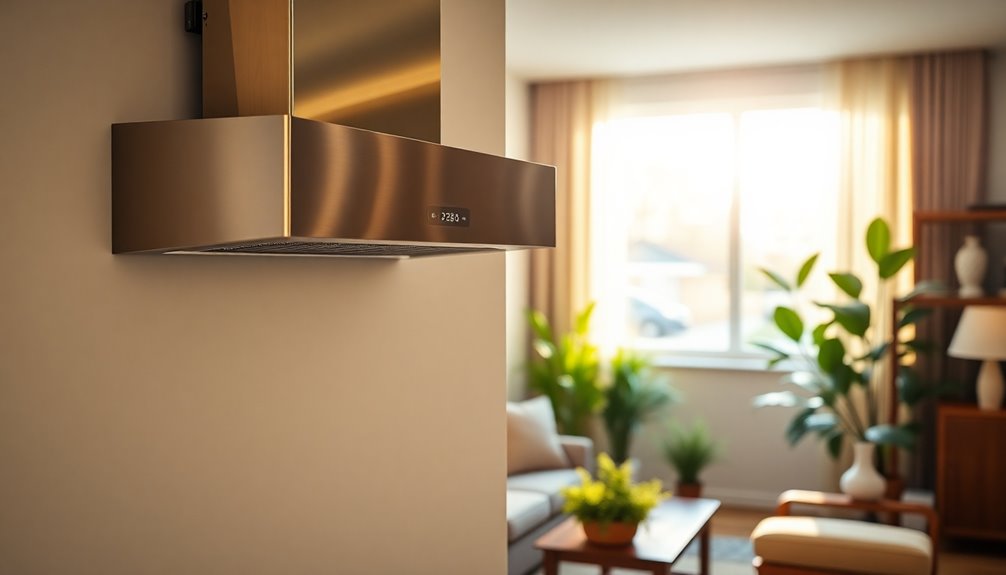
As technology continues to evolve, HVAC systems are becoming more efficient and user-friendly, enhancing both performance and comfort.
The Carrier Performance series boasts a SEER rating of around 16.5, making it more energy-efficient than the Comfort series, which has a rating of up to 15.2.
With its two-stage system, you'll enjoy better cooling capacity and long-term savings on utility bills. Smart HVAC systems enable remote control via mobile devices, adding an extra layer of convenience to your comfort settings.
Both series support smart thermostats for remote control and programmable settings, allowing you to tailor your comfort.
Advanced features like variable-speed operation and zone control in the Infinity series further optimize efficiency.
Cost and Budget
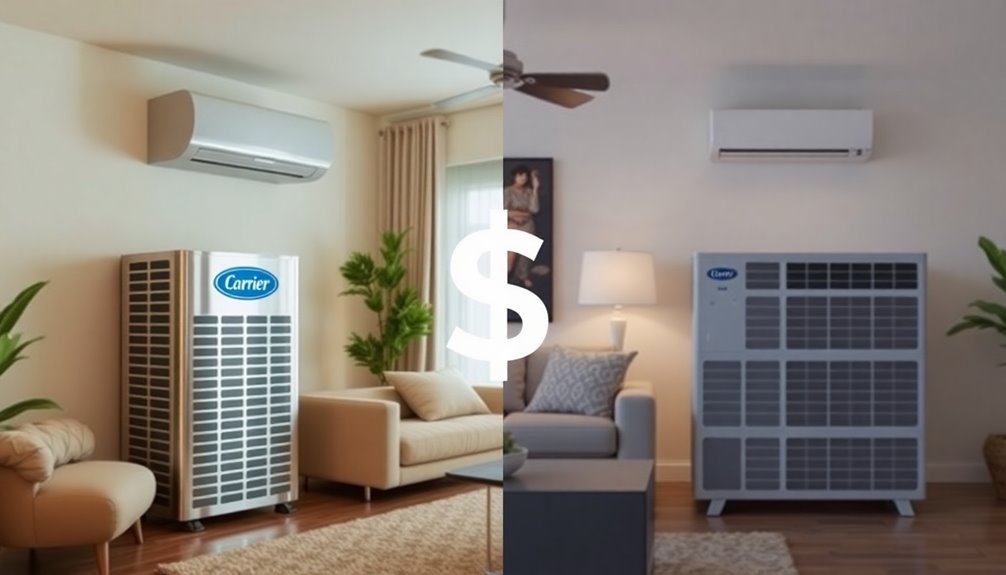
When considering your HVAC system, you need to weigh the upfront investment against potential long-term savings. While the average cost ranges from $5,000 to $12,500, choosing the right system can lead to lower energy bills over time. Understanding these financial aspects helps you make an informed decision that balances both budget and comfort. Investing in a system with a higher SEER rating can lead to significant savings on your annual energy costs.
Upfront Investment Comparison
Understanding the upfront investment required for HVAC systems is essential for making informed decisions about your home's comfort and budget.
Here are four key factors to take into account:
- Heat Pumps vs. Air Conditioners: Heat pumps typically range from $4,000 to $8,000, while air conditioners fall between $3,500 and $9,000.
- Energy Efficiency: Energy-efficient models can cost 20-30% more upfront but may save you money in the long run. Additionally, heat pumps are generally more energy-efficient than traditional AC units, leading to lower utility bills over time.
- Installation Costs: Central AC installation can range from $3,500 to $9,000, with ductwork replacement adding $1,500 to $5,400.
- Financing Options: Look for promotional financing, personal loans, or rebates to help manage costs effectively.
Evaluate these factors to find an HVAC system that aligns with your financial situation and comfort needs.
Long-Term Savings Potential
Choosing the right HVAC system not only impacts your upfront investment but also influences your long-term savings potential.
High-efficiency systems with SEER ratings between 16 and 21 can markedly reduce your energy bills, saving you $660 to $819 annually. Over 20 years, those savings can exceed $13,000.
Zoning features and smart thermostats allow you to target specific areas in your home, potentially cutting energy costs by 20-30%. Additionally, ductless mini-split systems provide zoned comfort without the need for ductwork, further enhancing energy efficiency.
Additionally, advanced systems like geothermal and heat pumps can lower your energy expenses by up to 60%.
With reduced maintenance needs and longer lifespans, newer models further contribute to your budget by minimizing repair costs.
Investing wisely today means enjoying substantial savings tomorrow.
Specific Models Overview

While exploring HVAC systems, it's essential to evaluate specific models that best fit your needs. Carrier offers two main series: Performance and Comfort, each with unique advantages.
- Performance Series: Up to 16.5 SEER, variable speed compressors for enhanced efficiency.
- Noise Reduction: Quieter operation than Comfort Series, with compact options for small spaces.
- Features: Two-stage compressors improve airflow and filtration while remaining budget-friendly. The Performance Series also includes options for variable speed compressors that adjust cooling output to match home demands.
- Comfort Series: Reliable, with a SEER rating of 16, single-stage compressors, ideal for homeowners on a budget.
Understanding these models helps you choose the right one based on your efficiency, noise preferences, and budget.
Dive deeper into each series to find the perfect fit for your home.
Energy Savings Potential

When it comes to maximizing your HVAC system's energy savings potential, the SEER ratings play an essential role in determining efficiency. Carrier offers units with SEER ratings ranging from 14 to 24, where higher ratings translate to more significant energy savings.
For instance, a 16 SEER unit can save you up to 70% on electricity compared to a 13 SEER unit, translating to about $514 in annual savings. Additionally, investing in a unit with a higher SEER rating ensures you benefit from improved energy performance and cost savings over time.
Beyond SEER, features like variable-speed compressors and programmable thermostats optimize your energy usage. With Carrier's zoning systems, you can tailor comfort in different areas, further enhancing efficiency.
Investing in advanced technology like inverter-driven compressors also helps reduce overall energy consumption while maintaining a comfortable home environment.
Installation Considerations
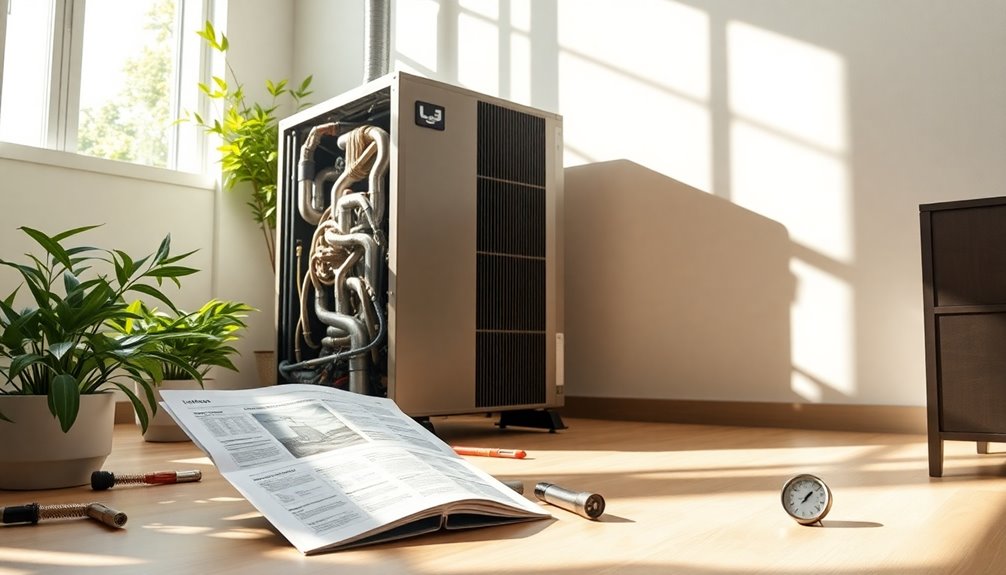
Maximizing energy savings through an efficient HVAC system also hinges on proper installation.
To achieve the best results, consider these key installation factors:
- Proper Sizing: Confirm the system isn't oversized to avoid frequent cycling and humidity issues. Proper sizing enhances system efficiency and ensures reliable heating and cooling throughout the year.
- Site Preparation: Inspect the installation site for adequate space, ventilation, and a level surface.
- Ductwork Inspection: Check for leaks and verify ducts are sealed and insulated to maintain efficiency.
- Electrical Setup: Make sure all electrical connections are secure, and the thermostat is correctly calibrated.
Choosing the Right System
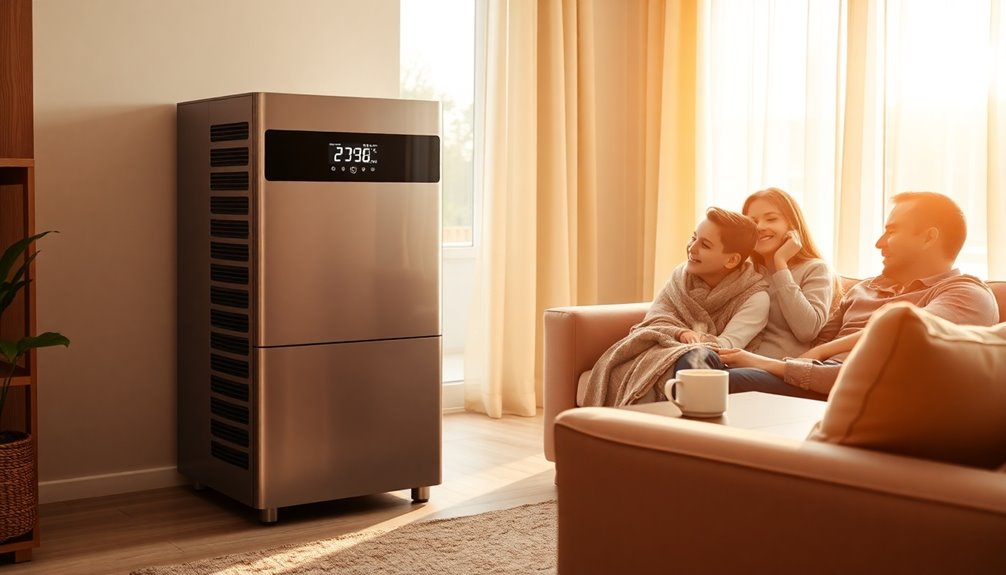
Choosing the right HVAC system can greatly impact both your comfort and energy bills.
Start by considering the system type that fits your home—central air conditioning works well with existing ductwork, while ductless mini-splits are perfect for homes without it. If you live in a mild climate, a heat pump might be your most efficient option.
Don't overlook energy efficiency ratings like SEER and HSPF; higher ratings lead to significant savings. Indoor air quality is also essential—advanced filtration and humidity control can enhance your home's environment. Additionally, investing in a modern system can enhance home value through improved technology and efficiency.
Finally, evaluate your budget. While upfront costs may be higher for energy-efficient systems, they often result in long-term savings. Consulting an HVAC professional can help you make the best choice for your needs.
Frequently Asked Questions
What Is the Ideal Temperature Setting for Energy Efficiency?
For energy efficiency, aim to set your thermostat between 72 to 78 degrees Fahrenheit.
A comfortable 78 degrees is ideal for most homes, while you can save more by increasing it to 85 degrees when you're away.
Consider using fans to help distribute cool air and adjust settings based on humidity levels and time of day.
A well-insulated home can maintain temperature better, reducing your overall energy usage and costs.
How Often Should I Service My HVAC System?
How often do you think your HVAC system needs a little TLC?
To keep it running smoothly, you should service it at least once a year, ideally in spring and fall. This guarantees it's ready for both heating and cooling seasons.
Don't forget to replace air filters quarterly and check for any issues monthly.
Following these guidelines helps prevent breakdowns, keeps your energy bills down, and extends the life of your system.
Can I Install a System Myself to Save Money?
You can definitely install an HVAC system yourself to save money, but it's important to weigh the pros and cons.
While you'll save on labor costs and gain flexibility, the complexity of the system can pose challenges.
You might enjoy the learning experience, but improper installation can lead to safety risks and warranty issues.
If you're confident in your skills and knowledge, it could be a rewarding DIY project.
Just proceed with caution!
What Are the Signs My HVAC System Needs Repairs?
You might notice your HVAC system showing signs that it needs repairs.
Listen for unusual noises like banging or grinding, which could indicate serious issues. If airflow feels weak or temperature fluctuates, that's a red flag too.
Watch for bad odors or leaks, as these often mean something's wrong. Ignoring these signs can lead to higher energy bills and a shorter system lifespan, so it's best to act quickly when you notice them.
Are There Financing Options for HVAC System Purchases?
When you're looking to purchase an HVAC system, several financing options can help ease the financial burden.
You can consider personal loans, which offer fixed rates and no collateral. Home equity loans might provide lower interest rates but involve your home as collateral.
Credit cards offer convenience but come with high rates unless paid off quickly.
Finally, check for manufacturer or contractor financing, which often has promotional rates tailored for HVAC purchases.
Conclusion
In the end, choosing the right HVAC system boils down to your specific needs and lifestyle. Whether you prioritize comfort or performance, weighing factors like efficiency, noise, and budget is key—after all, you don't want to end up in a hot mess! Consider the latest features and energy savings potential to guarantee you're making a smart investment. So, take a moment before making your decision; it's not just about keeping cool, but also about future-proofing your home.
